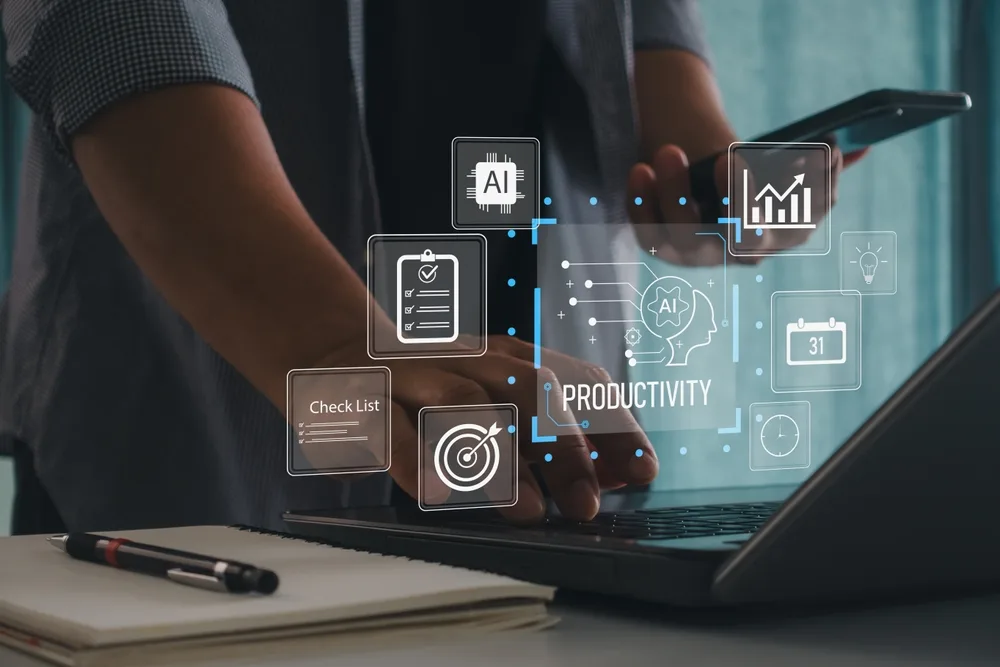
Artificial Intelligence (AI) is revolutionizing various aspects of our lives, from how we work and communicate to how we shop and entertain ourselves. This powerful technology holds immense potential and is becoming increasingly integrated into our daily lives.
As we navigate this evolving landscape, it’s vital to consider both the opportunities and challenges that come with it. Equipping ourselves with knowledge and adaptability can help us harness the benefits of AI and mitigate potential risks.
Understanding AI is not just for tech experts – it’s becoming essential for everyone. Here’s what you need to know about AI and its implications for society, work, and daily life.
Understanding AI Hype
While AI has made significant strides in recent years, there’s also a lot of hype around it. It’s essential to have a realistic understanding of what AI can and can’t do.
For example, despite advancements, we are still far from developing Artificial General Intelligence (AGI), a type of AI that understands, learns, and applies knowledge across a wide range of tasks at the level of a human being.
As AI becomes more pervasive, it’s crucial to promote AI literacy. This doesn’t mean everyone needs to know how to build AI systems, but rather have a basic understanding of how they work, their potential and limitations, and their societal impact.
How Safe is AI?
AI brings new opportunities but also new threats. Cybersecurity is becoming increasingly critical as more systems become AI-driven. Additionally, the rise of deepfakes (synthetic media where a person in an existing image or video is replaced with someone else’s likeness) illustrates the potential misuse of AI technology.
There’s growing discussion about regulating AI, balancing the need to mitigate risks, and protecting individual rights while fostering innovation. Regulatory considerations often include ensuring transparency, accountability, and the ethical use of AI.
The development and use of AI raise many ethical questions. Issues of privacy, bias, and fairness often come to the forefront. For instance, AI systems can unintentionally perpetuate existing biases if trained on biased data. Also, there are ongoing discussions about accountability and the right to explanation when AI systems make decisions affecting individuals.
- AI and Society
AI and Social Interaction
AI-driven technology transforms how we interact. For instance:
- Social media algorithms powered by AI curate personalized feeds, influencing our perceptions and interactions.
- AI chatbots simulate human conversation, providing customer service, mental health support, and more.
However, these technologies also raise concerns about privacy, data security, and the potential for manipulation.
AI and Accessibility
AI offers significant potential for improving accessibility for people with disabilities. Voice recognition software helps those with mobility issues, while AI algorithms can provide descriptive text for images, aiding visually impaired individuals. However, ensuring these technologies are widely available and affordable remains a challenge.
- AI and Work
AI in the Workplace
AI is reshaping the job market. Automation and AI technologies can streamline repetitive tasks, increasing efficiency. Many industries, from healthcare to finance to retail, use AI for data analysis, predictive modeling, and personalized services. However, this shift also brings fears of job displacement due to automation.
Skill Demand in an AI-Driven Market
With the rise of AI, there’s a growing demand for skills like data analysis, machine learning, and AI ethics. Even non-tech jobs increasingly require digital literacy and a basic understanding of AI principles. Upskilling or reskilling for the AI-driven future is becoming crucial.
- AI and Daily Life
AI in Everyday Technology
From recommending songs on Spotify to powering voice assistants like Alexa or Siri, AI is integral to many technologies we use daily. Smart home devices, AI-driven fitness trackers, and personalized shopping recommendations all rely on AI.
AI and Personal Finance
AI is transforming personal finance, with robo-advisors offering personalized investment advice and budgeting apps using AI to provide spending insights and savings tips. These technologies democratize financial planning, making it more accessible to low and moderate-income households.
The Future of AI
As we become more reliant on AI, it’s essential to engage with these issues, considering the broader implications of AI on our society and our lives. Predicting the future of AI is challenging due to the rapid pace of technological advancement and the myriad of ways it can be applied.
However, based on current trends, we can anticipate several developments:
- More Advanced AI Applications
We can expect to see more sophisticated uses of AI in fields like healthcare, where AI could contribute to breakthroughs in disease diagnosis and treatment. In the business world, AI will become an increasingly important tool for data analysis, predictive modeling, and customer service.
- AI in Everyday Life
AI will become even more integrated into our daily lives as technology advances. This could mean more advanced personal assistants, sophisticated recommendation algorithms, and more “smart” home and personal devices.
- Increased Automation
Automation, driven by AI, is likely to continue growing. This could mean increased efficiency in many sectors but could also lead to job displacement. As a result, there’s likely to be an increased focus on retraining and upskilling workers for new types of jobs.
- Ethical and Regulatory Developments
As AI becomes more prevalent, we can expect increased attention to ethical issues, such as fairness, privacy, and transparency. There’s likely to be more focus on developing regulations and standards to guide the development and use of AI.
- AI and Inequality
There’s a risk that the benefits of AI could be unevenly distributed, leading to increased inequality. Those with the resources to develop and use AI may gain disproportionate benefits, while others may be left behind. Addressing this issue will be a significant challenge.
- Continued Progress Towards AGI
While true AGI – AI that can understand, learn, and apply knowledge across a wide range of tasks at the level of a human being – is still a long way off, progress will continue to be made. The development of AGI would have profound implications for society.
Key Steps for Preparing for the Future of AI
- Stay Informed: Keep up-to-date with the latest developments in AI. Follow reputable news sources, blogs, and forums dedicated to AI and related technologies.
- Develop Relevant Skills: As AI becomes more prevalent, having a basic understanding of how it works will become increasingly valuable. Consider taking online courses or attending workshops on AI and related topics.
- Adapt to Automation: Consider how AI could impact your job and start developing new skills that will be in demand in an AI-driven job market.
- Think Ethically: Reflect on the ethical implications of AI, from privacy issues to potential biases in AI systems. Support companies and initiatives that prioritize ethical AI practices.
- Advocate for Fair AI Policies: As AI regulation continues to develop, voice your support for policies that promote transparency, accountability, and fairness in AI.
- Embrace AI in Everyday Life: Consider how AI could make your life easier or more efficient. This could be as simple as using a virtual assistant or as complex as setting up a smart home system.
- Plan for AI in Your Business: If you run a business, consider how AI could help you operate more efficiently or better serve your customers. Consider consulting with an AI expert to explore potential use cases.
These steps can help individuals and businesses prepare for the future of AI, leveraging its potential benefits while minimizing its potential risks.



